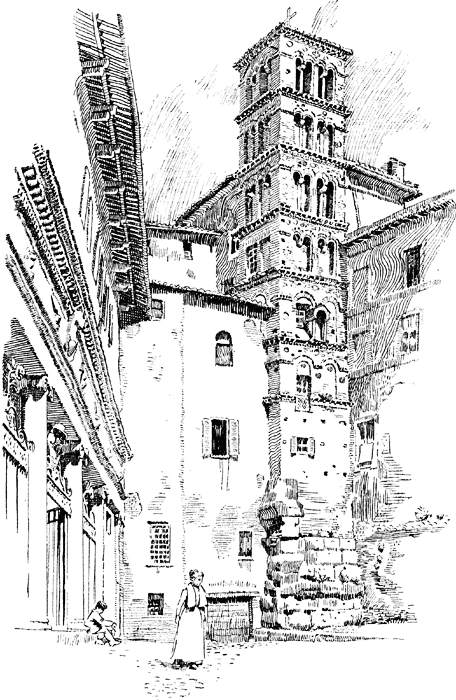
Roderick Robertson
An insula is the plot of land between major streets with four, six, or even eight high-rise apartment buildings . The buildings are separated by alleyways which connect to a central park/garden for the residents of the apartment buildings, which is more often a trash-strewn dump where everyone empties their chamber-pots and rats (and worse) roam though the straggly weeds. Each individual apartment building is also built around an open space, which acts as a light well for the rooms on the inner walls of the building. The central park contains the communal well for the insula.
As with the earlier style of building, the ground floor of the building is composed of shop or working space, where residents of the insula can buy bread, pre-cooked dinners, sandals, and sundries of all kinds. Shops are connected to the apartment directly above by stairs. Above the second floor are single-family apartments, usually three rooms – a Living/dining room, a master bedroom and a second bedroom. There are between six and ten apartments per floor, and an apartment building can be as high as seven floors (by Imperial Decree, no apartment building may have more than seven floors). Usually one stairway connects all the floors. In larger buildings, two stairways may be present. A single building may house 60 families or nearly 400 hundred residents, and a single Insula may have up to 4000 residents.
Each insula has a flowery name (much like modern apartment complexes), and each building in the insula is numbered. Or at least, they are supposed to be numbered – the real way to find someone in an insula is to ask. Each insula acts as a small town, with its own services, restaurants, taverns, and goods merchants.
The apartment buildings are normally built with stone outer walls and thin wooden partitions separating apartments. Doors are rarely worth barring, as an enterprising thief can simply break through the wall to gain entrance to an apartment. Rather than have to replace a wall, most residents simply leave their door unbarred.
 The ground floor normally has toilets washed with water from the civic aqueducts, used by all the residents of the building. However, walking down six flights of dark stairs simply to relieve oneself is rather onerous in the middle of the night, so residents keep chamber pots, emptying them in the morning. In the better Insulae, they empty them into the toilets. In most, however, they simply empty them out the windows, with or without a cry of “Slops!” to warn those below.
The ground floor normally has toilets washed with water from the civic aqueducts, used by all the residents of the building. However, walking down six flights of dark stairs simply to relieve oneself is rather onerous in the middle of the night, so residents keep chamber pots, emptying them in the morning. In the better Insulae, they empty them into the toilets. In most, however, they simply empty them out the windows, with or without a cry of “Slops!” to warn those below.
Each building is supposed to have a manager appointed from the residents by the City Overseer. The manager acts as the general contractor, renting agent, and complaints department. He is allowed to settle disputes by the most expedient means, which often means whoever paid the highest “fee” wins the case. Each insula, likewise, has a Council made up of representatives from each building, plus a city official.
Each Insula has a resident spirit, which protects the buildings and residents from fire, sickness and other ills. A small temple houses the Insula’s spirit, and is administered by a Lunar Priest. Some Insular temples are well-run, with bright lights, clean clothes and a staff of Priests, acolytes and altar boys,. Most, though are little more than an empty room overseen by a depressed priest who watches the residents pass him by. The spirit can make a well-run Insula a joy to live in, but many spirits are simply overwhelmed by the conditions of the Insula: by cracked walls, water wells poisoned by human waste and toilets stopped up with trash, Insula gangs and disheartened residents.





